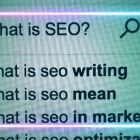CMS: Calming More Stress with a Content Management System
What do you know about a content management system [CMS]? Simply put, a CMS is like installing Microsoft Word on your website. With it, you and your staff can change many elements of your website, including the copy and images. You can also add or rename buttons, upload videos, even add or delete whole pages!
"Why," you ask, "would I want to give myself more work to do? My plate is full enough, thanks!"
While having a CMS is certainly not necessary for every website, it can provide several real benefits. With it, you can:
- Change information on your website in direct response to the needs of your market. If, for instance, you sell widgets for $.50 each, and you learn that your competitor is offering a huge discount on the same widget, you can immediately logon to your site and change the price of your widgets.
With that kind of convenience, you don't need to call your webmaster, ask them to make the change and wait for it to happen. Rather, you can update your website on your own schedule.
- Save money on maintenance by managing updates in-house. It's true that changing the copy and images on your website doesn't take long, but the technical staff at your web agency may need to de-archive files, hunt down the password for your site, make the edits, check the formatting, and so on... All of that work takes time, and all of that time is billable to you.
If you're making changes once or twice a year, it's probably more cost-effective to let the agency do those updates. If, on the other hand, you revise your site once a week or even once a month, you may save a considerable amount during the course of a year by doing it yourself.
There are a variety of CMS options for you to consider; some commonly-used ones are Drupal and Joomla. Talk to your web developer to see which one is the best fit for your needs.
Installing a CMS on your site will require a bit more work on the part of your web developers and cost a little more up-front, but the savings you realize from being able to maintain the site yourself may offset that cost.
Once you have a CMS-friendly site, you don't have to go it alone. Your CMS will have a password-protected login for each user so any of your staff can write changes. And because the CMS has various security levels, you can control who has access to make changes, and even how much access they have.
That level of security means that no one person can change your website's content without the approval of at least one other person. Unless, of course, you're logged in as the administrator, in which case you can do anything you want. [Insert ghoulish laugh here.]
Even if you have an existing site that doesn't have a CMS, you may be able to have this handy tool installed. Contact your agency for more information.
While a CMS is a great solution for many, it's not for everyone. Consult with your web developer to see if it makes sense for you. And happy CMS'ing!
Next month, we'll discuss how a picture can be worth a thousand words...especially on your website!
 An agency-eye view of Marketing, Advertising, Branding, Design & Media.
An agency-eye view of Marketing, Advertising, Branding, Design & Media.




